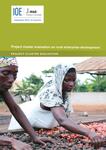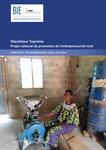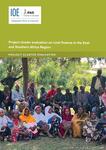Page Header
Rural Livelihoods Economic Enhancement Programme
Overview
The Independent Office of Evaluation (IOE) has prepared a performance evaluation report on the Rural Livelihoods and Economic Empowerment Programme (RLEEP) in the Republic of Malawi. The programme took place from 2009 until 2018, with a total project cost of US$26.1 million. Of this sum, IFAD contributed US$8.9 million as loan and US$6 million as grant. The PPE concludes that the programme took an innovative approach, which was largely effective. The programme increased overall productivity and provided a good foundation for pro-poor value chain development by establishing useful partnerships and initiatives that facilitated farmers’ access to markets. The grant facility was an appropriate mechanism for collaboration with NGOs, which greatly enhanced outreach and group formation activities. Some farmer groups managed to grow into cooperatives and strengthen market linkages. However, the targets of the programme proved to be overly ambitious and would have required stronger technical capacities to be achieved. The programme implemented a large number of activities in parallel and there was little time for adjustments when challenges arose. Participation of the private sector was still insufficient. Lastly, the programme did not have sufficient time to address the structural issues undermining value chain development. IFAD is preparing for the second phase of the programme in Malawi, called Transforming Agriculture through Diversification and Entrepreneurship (TRADE). The report offers several recommendations for this follow-up programme, including: greater participation by government partners, enhanced partnerships and complementarities among development partners, promotion of innovative approaches to service provision, and greater attention to farmers’ empowerment in the development of value chains.Report Details
| Year Published | |
| Type | |
| Joint | No |
| Partner/s | N/A |
| Consultant name | Stephen Tembo - Teresa Maru |
| Agency Focal Point | Johanna Pennarz |
| Focal Point Email | j.pennarz@ifad.org |
| Managed by Independent Evaluation Office | Yes |
| Country/ies |
YOU 'RE READING
Rural Livelihoods Economic Enhancement Programme











